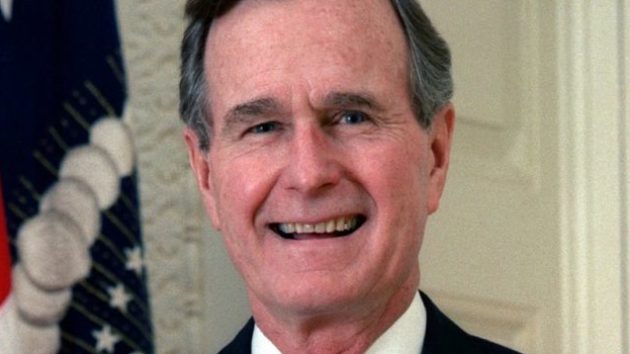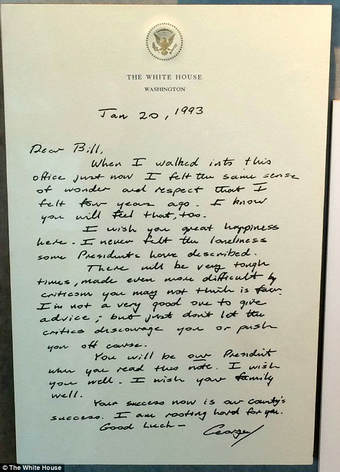On The Passing Of President George H. W. Bush.
He stood at the White House steps on January 20, 1989, flanked by his wife, Barbara. He was dressed impeccably, of course, as the occasion of the peaceful transition of power in the most powerful nation of the world calls for a certain degree of regality. He was bidding goodbye to arguably the most colorful couple to have inhabited the White House, Ronald and Nancy Reagan, and with that, acknowledging that an era had ended and that a new one would begin.
That is my most vivid image of George H. W. Bush. Undoubtedly, there were others, like when I read his lips saying that there would be no new taxes and when he proclaimed his disdain for broccoli. But that moment when he accepted the helm of the greatest vessel ever assembled was particularly poignant. Even then, we all knew that Reagan was going to be a monumental twentieth-century figure, but as we watched the outgoing couple bid adieux to the new we felt reassured because of the steadfastness and decency exuded by the incoming president.
Last night, just short of thirty years later, the man who led us through life after Reagan, the man who acted against the oppressive actions of tyrannical regimes, the man who helped decrease the nation’s deficit despite having to break his word to the American people, passed away. And sadness consumed me.
George H. W. Bush had all the makings of a great president. Armed with the experience of having served as a naval officer in World War II, having been the Director of the Central Intelligence Agency, United States Ambassador to the United Nations and a member of the House of Representatives, there appeared to be no battle he could not handle. He was humble, mild-mannered, and respectful, all qualities that America would want in its President. Most characteristic of his reverential and reserved style was when he refused to “spike the football” on the Soviet Union in the aftermath of the falling of the Berlin Wall. The negotiations were amongst the most delicate in history, but Bush, despite criticisms from both of his domestic flanks, maneuvered the process to a successful conclusion. His actions with Soviet Premier Mikhail Gorbachev brought about the unification of Germany and signaled the end of the Cold War.
And when Manuel Noriega, the Panamanian dictator, was using his platform to traffic drugs into the United States, it was H.W. who put a stop to it. Bush sent 26,000 American troops to topple and capture Noriega, ultimately forcing the maligned dictator to stand trial in the United States.
On August 2, 1990, Iraq invaded Kuwait in what many perceived to be a local skirmish. Herbert Walker Bush led the nation again. Bush would not let Iraq’s aggressive posture stand unchallenged. He would singlehandedly assemble a coalition of 35 nations to stampede into Kuwait and oust Saddam Hussein from the boundaries of its oil-producing neighbor. It was also Bush who made the decision, despite the undefended state of the road to Baghdad, not to chase the retreating Iraqi forces to their capital and send the region into a sea of uncertainty.
This is when we got to know President H. W. Bush, as his presidency was the first to be scrutinized by the unyielding eye of 24-7 media coverage. It was also at this time that I had my closest, yet incredibly removed association with H.W. He was my Commander in Chief when we mobilized into war for the first time since Vietnam.
It somehow defies reality that President Bush would have only served one term. Despite his great judgment on foreign matters and even some success in the domestic front with the Americans With Disabilities Act, Bush would come face to face with a political firestorm that would ultimately lead to his downfall.
If Donald Trump was revolutionary in the twenty-first century, Bill Clinton was equally so at the end of the twentieth. Unquestionably, H.W., who at one time saw an 89% approval rating, opened the door to distrust and a presidential challenge when he reneged on his emphatic promise not to raise taxes. Although historical analysis and retrospect acknowledge that the decision made in the face of a mounting deficit was not unwarranted, the political consequences were devastating. Rightly or wrongly, Bush was viewed with mistrust, and the nation’s right wing flirted with the possibility of another Republican candidate. Of course, a lackluster economy with a high unemployment rate would not help his cause. And the morally challenged, saxophone playing, sunglass-bespectacled, youthful, and hip Bill Clinton received a great uplift from the rogue business tycoon, Ross Perot, who once again proved that the presence of a third party candidate in a presidential race will only serve to harm the candidate he is most like. Bush earned a mere 37.5 of the vote in his 1992 reelection bid, the least for any major party candidate in recent history.
Many say that adding to his woes was a poorly selected plank of family values as the centerpiece of his campaign when Americans were concerned about jobs. That may be so. But as we moved across the Clinton presidency with its sex scandals and witnessed the nation’s continued moral decay, many of us reflecting upon that message recognize that H. W. Bush was right.
Of course, H.W.’s legacies would not be limited to his contributions in international relations and politics. He and his wife Barbara raised another president and a governor, and their grandchildren may accomplish even more.
But perhaps the greatest single testament to H.W.’s character and the standards he upheld was a holographic letter he penned to incoming President Bill Clinton, the man who painfully unseated him. Within it is this sentence:
“There will be very tough times, made even more difficult by criticism you may not think is fair. I’m not a very good one to give advice; but just don’t let the critics discourage you or push you off course.”
Sage advice, not just for an incoming President, but also for every one of us.
Thank you for your service, Mr. President, and may God keep you close.
EDITORS NOTE: This column with images originally appeared in The Federalist Pages. It is republished with permission.




Leave a Reply
Want to join the discussion?Feel free to contribute!